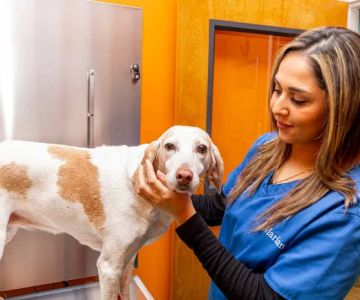Could I Be a Veterinary Nurse?
Exploring the Path to Becoming a Veterinary Nurse: What You Need to Know
- Veterinary Nurse Overview
- Skills Required to Become a Veterinary Nurse
- Veterinary Nurse Education: Steps and Qualifications
- Daily Tasks and Responsibilities of a Veterinary Nurse
- Career Prospects and Opportunities for Veterinary Nurses
- Challenges and Rewards of Being a Veterinary Nurse
If you're considering a career in veterinary nursing, you're likely wondering, "Could I be a veterinary nurse?" The role of a veterinary nurse is an essential one in the veterinary field, as these professionals provide critical support to veterinarians in various settings, from animal clinics to research labs. But what does it take to become a veterinary nurse, and is this the right career path for you? In this article, we’ll explore what it means to be a veterinary nurse, the skills you need, the education required, and what you can expect from the job on a daily basis.
1. Veterinary Nurse Overview
A veterinary nurse, also known as a veterinary technician in some countries, is a trained professional who works alongside veterinarians to provide medical care and support to animals. Veterinary nurses perform a wide range of tasks, from administering anesthesia during surgeries to conducting diagnostic tests and providing emergency care. While the role can vary depending on the workplace, the primary focus is always on animal health and ensuring that patients receive the best care possible.
The demand for veterinary nurses has been growing, as the need for animal care increases worldwide. Whether in a clinic, hospital, or zoo, veterinary nurses are essential to the operation of these facilities, offering technical expertise, compassionate care, and administrative support. As a veterinary nurse, you'll be involved in hands-on work with animals, often assisting in surgeries, treatments, and the daily care of various species.
2. Skills Required to Become a Veterinary Nurse
To be successful as a veterinary nurse, certain skills and attributes are necessary. While formal education is crucial, certain personal traits are just as important in this line of work. Here are some key skills required to become a veterinary nurse:
Compassion and Empathy
One of the most important qualities a veterinary nurse can have is compassion for animals and empathy for their owners. Veterinary nurses often work with sick or injured animals, which can be stressful for both the animals and their owners. Being able to provide comfort, calm nerves, and offer support is critical to the role.
Communication Skills
Veterinary nurses work closely with pet owners, veterinarians, and other staff members. Clear and effective communication is essential, whether it's explaining a treatment plan to a pet owner or relaying important medical information to a veterinarian. In my experience, one of the most rewarding aspects of being a veterinary nurse is communicating with owners to help them understand their pets’ conditions and treatment options.
Technical Skills
Veterinary nurses must have solid technical skills to handle medical equipment, perform diagnostic tests, and assist in surgeries. From taking blood samples to administering injections and monitoring anesthesia, these technical tasks require precision and attention to detail. If you're comfortable with medical procedures and equipment, this role could be a great fit for you.
Attention to Detail
Attention to detail is a crucial skill for veterinary nurses, especially when handling medications, performing procedures, or monitoring animals post-surgery. Mistakes in these areas can have serious consequences for the animals under care, so being meticulous and focused is essential in this job.
3. Veterinary Nurse Education: Steps and Qualifications
To become a veterinary nurse, you typically need to complete formal education and obtain certification. The exact path can vary depending on the country and local regulations. Here’s a general outline of the steps involved in becoming a veterinary nurse:
1. Obtain a High School Diploma
The first step to becoming a veterinary nurse is to complete high school or obtain a GED. It’s important to have a strong foundation in science, particularly biology and chemistry, as these subjects will be crucial throughout your veterinary education.
2. Enroll in a Veterinary Nursing Program
The next step is to enroll in an accredited veterinary nursing program. In many countries, this is a two- to three-year program that includes both classroom learning and hands-on clinical experience. The program covers a wide range of topics, including anatomy, animal behavior, pharmacology, and surgery. Some programs also offer specialized training in areas such as anesthesia or dental care.
3. Gain Clinical Experience
Veterinary nursing programs often include a clinical or internship component, where students gain real-world experience working with animals under the supervision of licensed veterinarians. This is a crucial step in learning the practical skills required to be a successful veterinary nurse. During my time volunteering at a local animal clinic, I was able to apply what I had learned in class while also learning from experienced professionals in the field.
4. Obtain Certification and Licensing
In many countries, veterinary nurses must pass a certification exam to work professionally. This exam tests the skills and knowledge acquired during your education and clinical experience. Once certified, you can apply for positions as a veterinary nurse, though continuing education is often required to maintain certification and stay current with new medical practices.
4. Daily Tasks and Responsibilities of a Veterinary Nurse
On a typical day, veterinary nurses handle a wide variety of tasks. Here’s an overview of some common duties:
Assisting with Animal Surgeries
Veterinary nurses often assist in animal surgeries by preparing equipment, assisting the veterinarian during the procedure, and monitoring the animal’s vital signs. These tasks require a solid understanding of medical procedures and the ability to stay calm under pressure.
Administering Medications and Treatments
Another important responsibility is administering medications and treatments to animals. Whether it’s giving a pet oral medication, administering an injection, or helping with wound care, veterinary nurses play a key role in ensuring that animals receive the right care at the right time.
Client Communication
Veterinary nurses often communicate directly with pet owners, explaining the care that their animal needs, offering advice, and providing updates on their pet’s condition. The ability to communicate clearly and compassionately with clients is one of the most vital aspects of the role.
5. Career Prospects and Opportunities for Veterinary Nurses
The career prospects for veterinary nurses are strong, with opportunities in various areas of animal care. In addition to working in animal clinics and hospitals, veterinary nurses can pursue roles in research, teaching, wildlife care, and even in the pharmaceutical industry, helping to develop medications and treatments for animals.
Specialization Opportunities
As a veterinary nurse, you can also specialize in certain areas, such as anesthesia, dentistry, or dermatology. Specialization often leads to higher earning potential and more advanced roles within veterinary care. With the right experience and additional certifications, veterinary nurses can also move into supervisory or managerial positions in clinics and hospitals.
6. Challenges and Rewards of Being a Veterinary Nurse
Like any healthcare profession, being a veterinary nurse comes with both challenges and rewards. One of the biggest challenges is dealing with emotional situations, such as euthanasia or caring for critically ill animals. However, the rewards of making a difference in the lives of animals and their owners make it an incredibly fulfilling career. I’ve heard countless stories from veterinary nurses about the satisfaction they get from seeing an animal recover and go home to its family after receiving the right care.
Overall, becoming a veterinary nurse is a career that requires dedication, compassion, and a love for animals. If you’re someone who is looking for a meaningful and impactful profession, this could be the perfect path for you. By gaining the right education and skills, you can help improve the lives of animals and their families every day.
Related Articles

Aug 20, 2025

Aug 19, 2025

Aug 19, 2025

Aug 19, 2025

Aug 19, 2025

Aug 19, 2025

Aug 19, 2025

Aug 19, 2025

Aug 18, 2025
Subscribe to Our Newsletter
Get weekly pet care tips, vet-approved advice, and updates on nearby pet stores and clinics.


